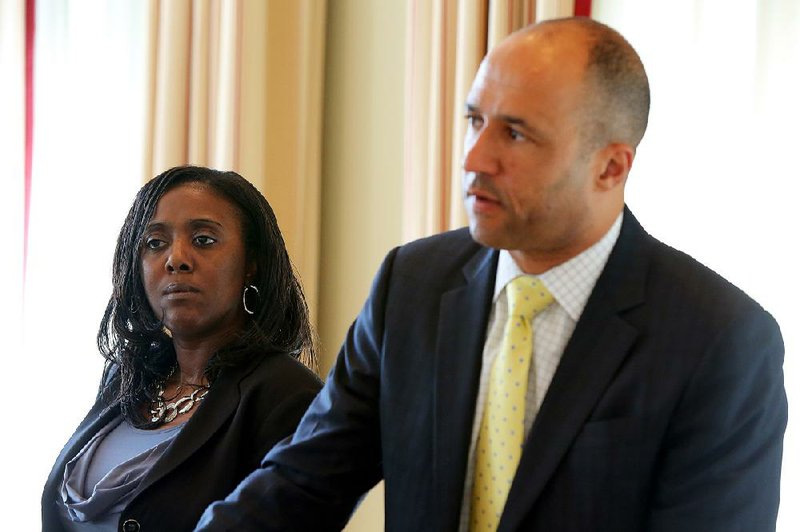A three-judge panel of the 8th U.S. Circuit Court of Appeals in St. Louis heard half an hour’s worth of oral arguments last week about whether Little Rock and a former police chief should be tried by a federal jury on liability questions in the 2012 death of a boy who was shot and killed by an officer.
The former officer, Joshua Hastings, was found liable for the death of the boy, Bobby Moore, in a trial a year ago this month. Jurors ordered Hastings to pay Moore’s mother, Sylvia Perkins, $415,000 in damages. Then in October, a judge ordered Hastings to pay an additional $382,585.65 in attorney’s fees and costs to Perkins.
Chances of collecting the money from Hastings are slim, however, attorneys for Perkins have acknowledged. Hastings was fired from the department for violating departmental rules during the Aug. 12, 2012, shooting in the parking lot of the Shadow Lake Apartments at 13111 W. Markham St., where officers said Moore and two friends were breaking into cars. Hastings was also charged with manslaughter, but the charge was dropped after two Pulaski County Circuit Court juries couldn’t reach a verdict.
Three months before the civil trial began, U.S. District Judge Brian Miller threw out claims against the city and a retired chief, Stuart Thomas, saying Perkins’ attorney, Mike Laux, had failed to establish a pattern of unconstitutional conduct that led to the shooting. Perkins had alleged that the city and Thomas failed to train, supervise, discipline and properly screen Hastings.
Laux asked Miller to reconsider, calling the judge’s decision “unfathomable” and saying it ignored vast amounts of “evidence” he had submitted.
The judge addressed Laux’s complaints in a 19-page order issued shortly before the trial began. He denied the reconsideration request, explaining that it was his role to follow the law of the 8th Circuit, not to determine whether the city or its Police Department operates “perfectly.” While Miller agreed that Laux had submitted a “voluminous” record, he said it was “full of sensationalistic overstatements and an assortment of irrelevant conduct riddling the LRPD since 1980,” making it impossible for him to exhaustively review every page.
The judge also said Laux “has a habit of misrepresenting the contents of evidence,” and that if the attorney had found compelling evidence for his position, it should have been “referenced specifically, represented accurately, and organized coherently.”
Perkins’ appeal of that pretrial ruling led to oral arguments Thursday before senior U.S. circuit judges Roger Wollman of Sioux Falls, S.D., and James B. Loken of Minneapolis, as well as Chief Judge Lavenski Smith of Little Rock.
Laux started out reprising one of his earlier arguments that Miller had “misquoted” case law. That prompted the appellate judges to cut him off, saying the argument “is of no moment,” as it had already been determined that the case law wasn’t misapplied.
As Laux tried again, one of the judges said firmly, “Forget the misquoting.”
Laux then compared the Police Department’s investigation of the Hastings shooting to an investigation of a 1968 massacre of civilians in South Vietnam by U.S. Army soldiers, in that “failure of leadership” was determined to have played a role.
“What’s the failure in Little Rock?” one of the judges asked.
Laux said the department tended to exonerate officers every time they killed, harmed or threatened anyone, making officers think they were immune from punishment.
“That wasn’t what happened in this case,” a judge said, reminding Laux that Hastings was charged with a crime.
While that was true, Laux said, his investigation showed that behind the scenes, “a lot happened that actually spared this very, very guilty person from going to jail,” speculating that it was because Thomas was friends with Hastings’ father, a police captain.
As examples, Laux said police never interviewed two key witnesses, and that blood found on the gearshift of the car Moore was driving at the time of the shooting wasn’t tested to see if it belonged to Hastings, whom Laux suspects reached into the car after the shooting and moved it out of reverse.
Two boys who were in the car with Moore when Hastings fired three shots, fatally striking Moore, said the car was moving backward at the time. Hastings, who was standing in front of the car, contended it was moving forward.
John Wilkerson, an attorney for the Arkansas Municipal League who represented the city at trial, told the appellate panel that the two witnesses were in fact interviewed, but they didn’t actually see the shooting.
He also said, “We admitted that the gearshifter was not tested,” which turned out to be “of no consequence” because other evidence proved that the car “was not traveling toward Hastings at the time of the shooting.” Wilkerson also noted that it was never established that Hastings had ever reached inside the car after the shooting.
Wilkerson argued that none of the department’s previous uses of deadly force were found to be unconstitutional, and without such a finding, the city couldn’t have been “on notice” about a need to change its policies or training.
He agreed that Hastings had previous blemishes on his record but said none that reflected a similar pattern of misconduct. He said the previous problems, such as failing to activate his patrol car’s dashboard camera, led the department to provide Hastings with remedial training.
“We submitted phone books of evidence,” Laux argued on rebuttal, telling the judges before he ran out of time, “There’s no reason we shouldn’t be able to get this case in front of a jury.”
